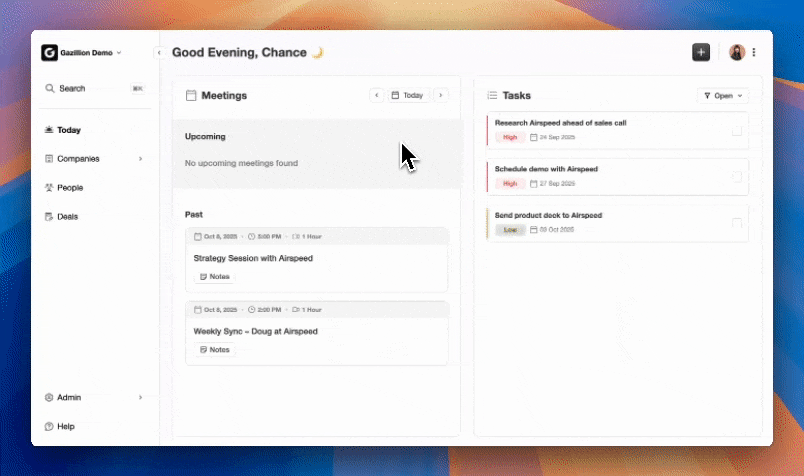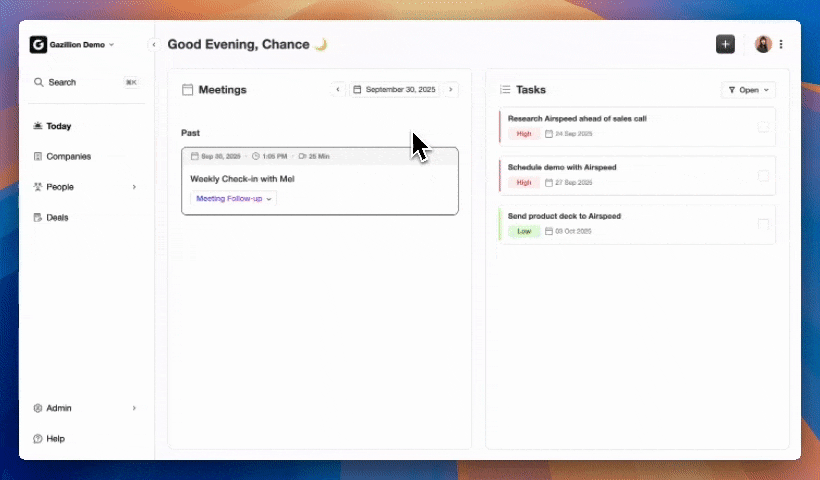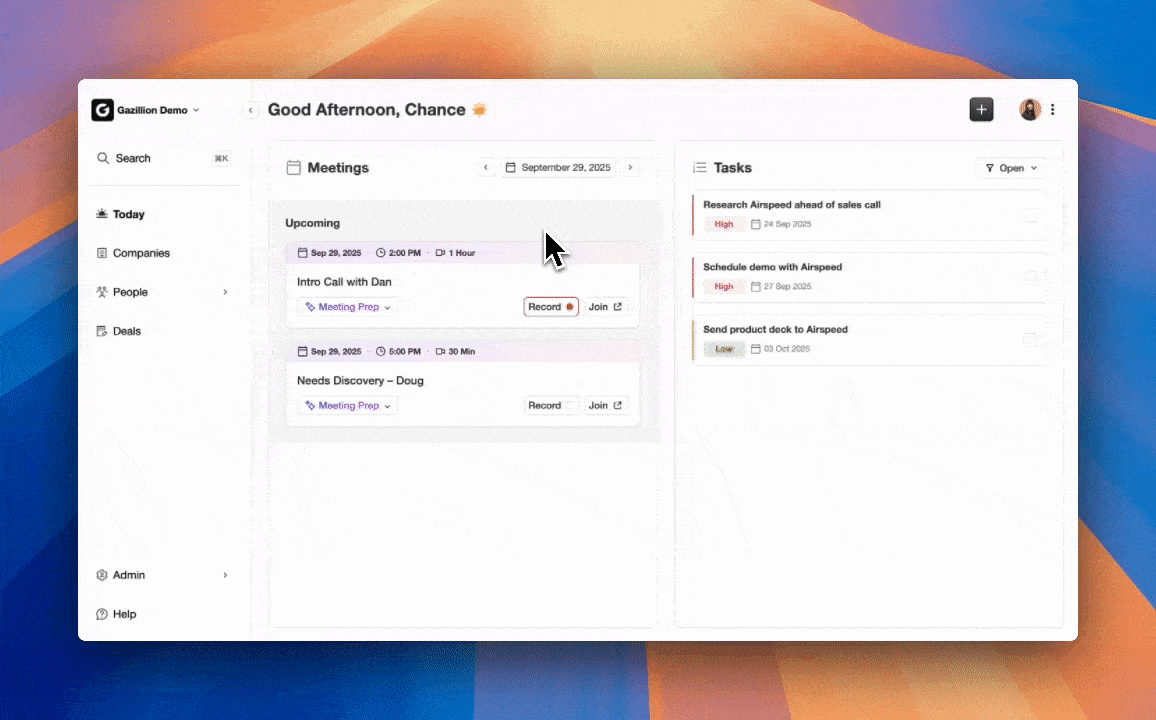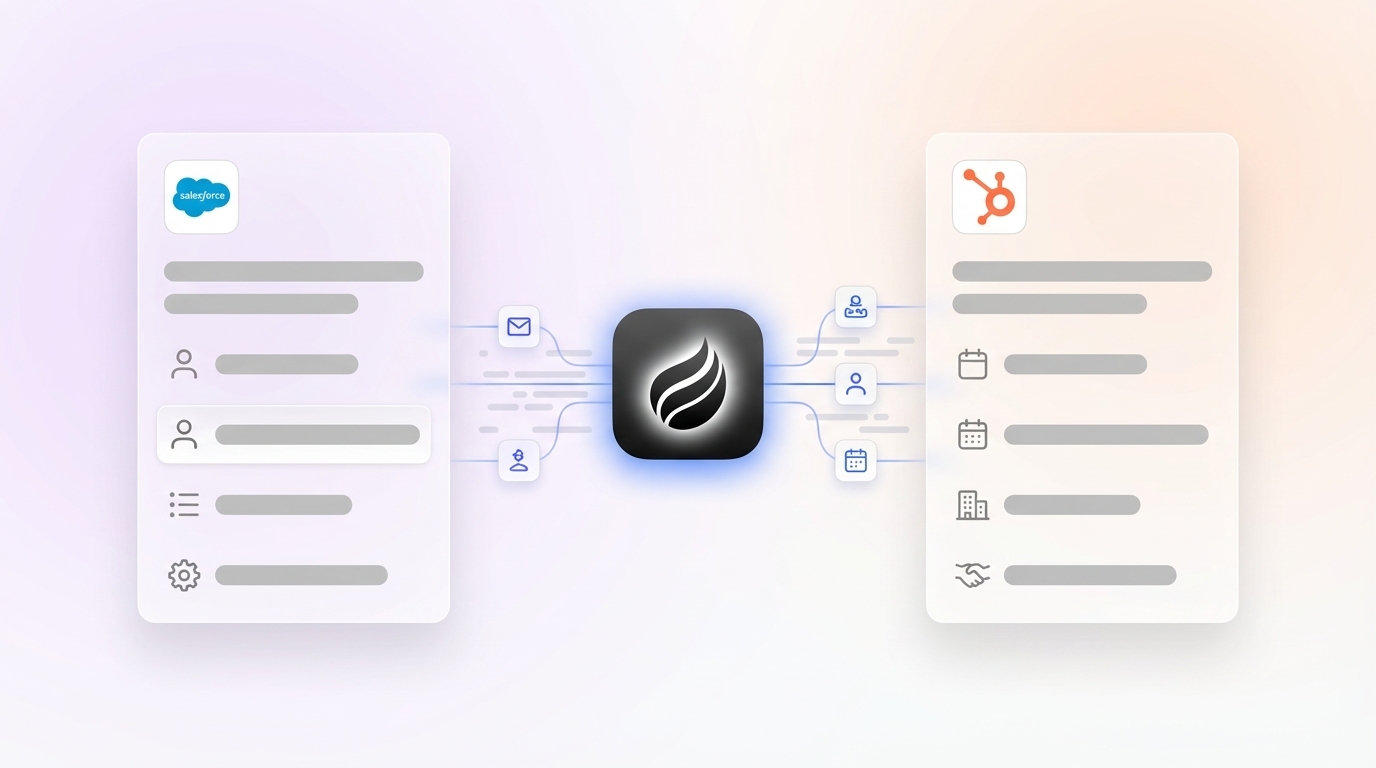Key takeaways
- High-quality Salesforce and HubSpot data is now essential for accurate AI-driven scoring, forecasting, and personalization, not a nice-to-have.
- Manual data entry and fragmented tools lower rep productivity and create unreliable reports, while AI agents can capture and structure data automatically.
- Coffee acts as an AI layer on top of Salesforce and HubSpot, automating data entry, enrichment, meeting capture, and pipeline insights.
- A clear integration strategy, strong data governance, and attention to user experience help teams avoid common pitfalls and increase CRM adoption.
- Teams can improve CRM data quality and save reps hours each week by using Coffee; request access to Coffee to see the impact on your Salesforce and HubSpot integration.
Organizations that want AI-ready CRM data and dependable insights can align Salesforce and HubSpot with Coffee to reduce manual work and improve revenue visibility.
Why Salesforce and HubSpot integration matters for AI in 2026
Accurate, complete CRM data now underpins every AI capability in sales and marketing. A robust integration between Salesforce and HubSpot, supported by an AI agent like Coffee, gives teams a unified and reliable view of customers.
The problem with legacy CRM data management
Many sales teams still depend on manual data entry, with reps spending large portions of their week updating records instead of selling. Fragmentation across sales and marketing tools scatters customer data and forces constant context switching. This poor experience drives low adoption, which results in missing activities, outdated fields, and forecasts that leaders cannot trust.
The AI inflection point: from passive software to active agents
AI agents such as Coffee shift CRMs from passive databases to active systems that capture, clean, and structure data automatically. This shift creates the conditions for reliable forecasting, accurate lead scoring, and relevant outreach.
How Coffee improves Salesforce and HubSpot data quality
Coffee operates as an AI agent that sits on top of Salesforce or HubSpot and focuses on data quality, rep productivity, and pipeline visibility. It turns CRM updates from a manual burden into an automated background process.
How the Coffee Agent improves your data flow
Automated data entry and enrichment keep contact and account records current. Coffee creates contacts and companies, logs activities from email and calendar systems, and enriches records with job titles, funding, and LinkedIn profiles. Reps can reclaim an estimated 8 to 12 hours per week that would otherwise go to admin work.
AI-powered meeting management converts conversations into structured CRM data. The Coffee Agent joins Zoom, Teams, and Meet calls, records and transcribes meetings where appropriate, summarizes key points, identifies next steps, and drafts follow-up emails. Notes can map to sales methodologies such as BANT or MEDDIC so managers see consistent deal information.

Accurate pipeline intelligence replaces spreadsheet-driven reporting. Because Coffee captures historical context for each opportunity, leaders can see week over week changes in a pipeline view rather than exporting CSV files and rebuilding reports.
Consolidating your tech stack with Coffee
Coffee covers workflows that often require several tools, including CRM data entry, enrichment, call recording, and forecasting support. This consolidation lowers cost and complexity, and it reduces the number of systems each rep must maintain. The CRM becomes a daily partner rather than a system of record that teams avoid.
Coffee as a companion app for Salesforce and HubSpot
Coffee connects to existing Salesforce or HubSpot instances through straightforward authentication. Once connected, it manages the flow of activities, contacts, and opportunities into the CRM so records stay accurate with minimal human input. These cleaner datasets increase the value of any reports or AI models that run on top of them.

Strategic integration choices for Salesforce and HubSpot
Leaders need a clear integration model that supports current workflows and positions the company for AI initiatives over the next several years.
Integrating for AI readiness
AI tools deliver value only when underlying data is timely and accurate. A well-designed Salesforce and HubSpot integration ensures clean movement of leads, contacts, and lifecycle stages. Coffee strengthens this foundation by automating data capture and enrichment, which improves predictive scoring and personalized engagement.
Choosing between hybrid and full migration models
Some organizations centralize fully on Salesforce or HubSpot. Others maintain a hybrid environment with both systems active. Coffee supports either choice by keeping data current and aligned across platforms. This flexibility helps teams evolve their CRM strategy without accepting poor data quality during transitions.
Operational best practices and pitfalls to avoid
Technology alone does not guarantee a strong integration. Successful Salesforce and HubSpot programs combine the right tools with clear ownership, governance, and change management.
Key stakeholders and alignment
Sales, marketing, and RevOps leaders should define data ownership, field standards, and shared success metrics together. Regular communication and a single, documented schema reduce conflicts over contact and account records. Clear roles also make it easier to decide which team updates which fields.
Assessing organizational readiness
Teams can gauge readiness by looking at CRM adoption rates, data completeness, and the amount of offline tracking in spreadsheets or personal notes. Low adoption and missing data signal the need for automation. Coffee reduces this burden by handling repetitive admin tasks so reps can focus on pipeline creation and deal progression.
Common pitfalls for experienced teams
- Underestimating data governance. Lack of defined ownership leads to duplicate records and inconsistent fields.
- Ignoring user experience. Integrations that do not match rep workflows result in low usage and unreliable reports.
- Focusing only on data sync. Moving data between systems without turning it into insight limits the impact of any integration.
- Expanding tooling without consolidation. Adding point solutions for each problem increases cost and confusion, while Coffee combines several of these functions in one agent-driven workflow.
Teams that want a more reliable integration strategy can evaluate Coffee in their own environment. Request access to see how it streamlines Salesforce and HubSpot operations.
Comparison: Salesforce and HubSpot integration data quality with and without Coffee
|
Feature |
Legacy Salesforce and HubSpot integration |
Salesforce and HubSpot with Coffee Agent |
|
Data entry |
Manual and time consuming processes, with many reps spending a large share of their week on admin tasks |
Automated creation of contacts and companies, activity logging, and enrichment from email and calendar data through the AI agent |
|
Data quality |
Unreliable inputs that cause inaccurate forecasts and reporting |
Consistent capture and structuring of ground truth data that supports trustworthy analytics |
|
Rep productivity |
Lower productivity, with limited time left for customer conversations and prospecting |
Reps reclaim an estimated 8 to 12 hours per week, while Coffee operates as a trusted co-pilot |
|
Pipeline visibility |
Manual exports and spreadsheet analysis, plus shadow CRMs that sit outside the main system |
Real-time pipeline intelligence with automatic change tracking and features such as a Pipeline Compare view |
The rise of AI agents in sales
AI agents are moving into the center of sales operations. Teams that adopt them early can reduce administrative work and improve the reliability of their revenue data.
An agent-driven operating model
The emerging model for 2026 places AI agents alongside reps as digital colleagues. These agents complete tasks that software once left to humans, from logging activities to organizing notes. Coffee follows this approach so that sales teams spend less time updating systems and more time engaging customers.
Coffee’s role in AI-powered sales
Coffee focuses on Salesforce and HubSpot users who want both short term productivity gains and long term strategic value from their CRM investments. By handling data quality at the source, Coffee improves the accuracy of forecasts, dashboards, and AI models built on top of CRM data.
ROI and security for AI initiatives
Organizations that use Coffee often see gains from fewer manual updates, better forecast accuracy, and a leaner sales tech stack. Coffee maintains SOC 2 Type 2 and GDPR compliance and does not use customer data to train public models, which supports strict security and privacy requirements.

Frequently asked questions
How the Coffee Agent handles data across Salesforce and HubSpot
The Coffee Agent scans connected email and calendar systems, associates each interaction with the right contact or company, and records these activities in Salesforce or HubSpot. This process keeps records complete without requiring reps to log every touchpoint manually.
How Coffee connects to outreach and meeting tools
Coffee integrates with Google Workspace or Microsoft 365 environments. The Agent can join Zoom, Teams, and Meet calls, record and transcribe where appropriate, and use that information to generate follow-up emails and update CRM records.
Expected ROI from using Coffee with Salesforce and HubSpot
Results vary by company, but many teams see time savings of 8 to 12 hours per rep per week as manual data entry declines. Cleaner data also supports more accurate forecasting and makes it possible to retire overlapping tools.
Coffee’s approach to security and compliance
Coffee operates under SOC 2 Type 2 and GDPR standards. Customer data stays private and is not used to train public models, which helps organizations meet internal and external compliance expectations.
Implementation timeline for the Coffee Agent
Most teams connect Coffee through a short authentication process and can begin syncing data soon after. Existing Salesforce and HubSpot workflows remain in place while the agent starts to capture and enrich information in the background.
Conclusion: Building an AI-ready Salesforce and HubSpot stack with Coffee
A strategic integration between Salesforce and HubSpot, supported by Coffee, gives organizations cleaner data, higher rep productivity, and more reliable insights. Automated capture and enrichment turn CRM systems into active partners for sales teams, not just record-keeping tools.
Organizations that want to improve CRM data quality and prepare for AI-driven sales can evaluate Coffee in their own stack. Request access and see how an AI agent upgrades your Salesforce and HubSpot integration.
